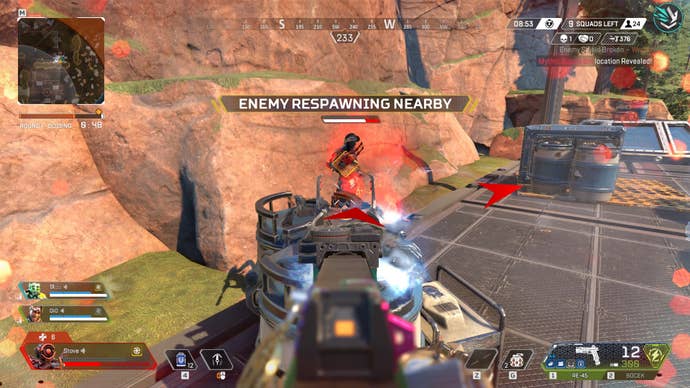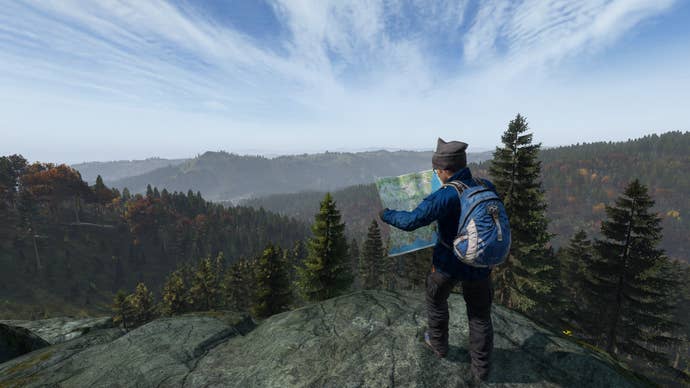Apex Legends launched its Season 26 update this week with the new Wildcard mode, what must be its fourth or fifth attempt at a ‘battle royale but faster’ sideshow. If anything, Wildcard – with its tightened safe zones, generous respawn allowances and automatic loot pickups – is the most ferocious, cage fightin’est variant yet, its matches routinely playing out as breathless slaughters as crammed-in squads fight, die, and resurrect over a condensed selection of strongholds.
Still, while I’ve enjoyed ApeLegs’ previous action-favouring tweaks, something about Wildcard underwhelms. It’s not the shooting, which is as crisp and dynamic as in any other Respawn FPS. And it’s not the simplified gear gobbling, which is fine for a supplementary mode. It’s that at the end of a Wildcard round, even the ones I’ve won, I’ve never felt that I’ve really gone anywhere or done anything except aim down my sights and left-click. In chasing nonstop drama it denies you something that good battle royales, and their progenitors, can so effectively deliver: a journey.
Journeys are, quietly and understatedly, what elevate battle royales above simply being big deathmatches. Claiming victory in BRs is more elating than winning at quickfire arena shooters not just because of the relative rarity of the event, but because it’s a satisfying end to the story of that match: one where you trekked across battlefields, gathered your tools, stalked prey, or survived ambushes. It’s a higher high, just as losing, in turn, is a lower low. Falling later on feels awful because you’d come so far, dammit, and the frustration in perishing early draws from the sense of injustice that you weren’t allowed to truly begin your journey at all.

Wildcard might not be trying to maintain this specific quality, knowingly aiming instead for a more focused showcase of gunplay skills. But the fact is, it’s a quality that’s missing. The brevity and chaos of matches overwhelms the opportunity for a journey to develop, often to the extent that you can’t even move from place to place. In vanilla Apex, you almost never finish a round where you started it. But Wildcard’s confined map space and free respawns encourage fights that usually begin instantly upon landing and drag on far longer than they normally would, bogging down both teams (and any others than show up for a cheeky spot of third-partying) in the same spot. Even if the zapping pain of a shrinking ring boundary forces everyone to shift, by that point the survivors will be so densely packed in that any egress just becomes an extension of the previous (if not still ongoing) battle.
Granted, the trekking part doesn’t sound like a compelling fantasy. Be it Apex, PUBG, or that other one with the racist Darth Vader, it’s the individual moments that tend to replay most vividly in the mind. I can’t remember my sister’s address, but I can remember a game-winning 1v3 play I made on World’s Edge in 2021, or losing a sniper duel on Miramar by accidentally popping my head in front of a friend’s scope, causing the most avoidable case of friendly fire since Starship Troopers’ boot camp.
It’s the journey, though, that enables these moments to take place, to set them up outside the immediate pressure of constant close-range gunfights, to contextualise them as chapters in a longer, richer tale. And it’s context that, at least in part, grants that emotive staying power. That triple KO could only happen because of my earlier travels, having dropped in alone and spent most of the match scavenging for the weapons and armour I’d end up needing to pull it off. Its point in the timeline – right at the match’s end, where it could bag me the glittering “CHAMPIONS” graphic I so hungrily craved – gifted it significance too, far more so than if it were a flashy but ultimately pointless skirmish at the start of a game I’d later lose.

If this all seems a bit overthinky for a hero shooter, blame the fact that I’ve also been playing DayZ – a game that gives you, if precious little else, plenty of time to think. The original Arma 2 mod holds an almost unique place in the battle royale genre’s history, its Survivor GameZ tournaments sharing responsibility with Minecraft’s Survival Games mod for popularising a playable version of the last-man-standing concept that had been established in, yet not widely spread beyond, manga and film. DayZ is a hardcore survival sandbox, not a competitive contest, but you can see the familial resemblance with BRs in how its stakes rise the longer you live, as well as how its extended periods of silent exploring are punctuated by brief, loud bursts of violence.
Journeys are central here too. Even more so, really, given that with no rounds to win or damage numbers to pad, the only thing you can do is get out there and see what happens. As we’ve known since 2012, this self-authorable freedom helps make DayZ one of the PC’s most effective anecdote generators; I’d wager anyone who’s played it more than once will have a riveting story of being mugged at gunpoint or edging a heart-in-mouth gunfight or being chased out of a city by a naked man blasting hardbass through his microphone. And, as with DayZ’s younger cousins, none of them would be half as memorable if they didn’t form a climax of that survivor’s journey. It might have been a journey through plenty of lonely fields and empty houses, but that’s the thing about climaxes: there’s no peak without the trough.
Wildcard mode, I fear, is what happens when a battle royale ditches the latter – without regard for the tension-building and story-setting that goes on in the quiet parts – and tries to make a game entirely out of climaxes. It probably makes for a better trailer. It definitely doesn’t make for a better journey.







